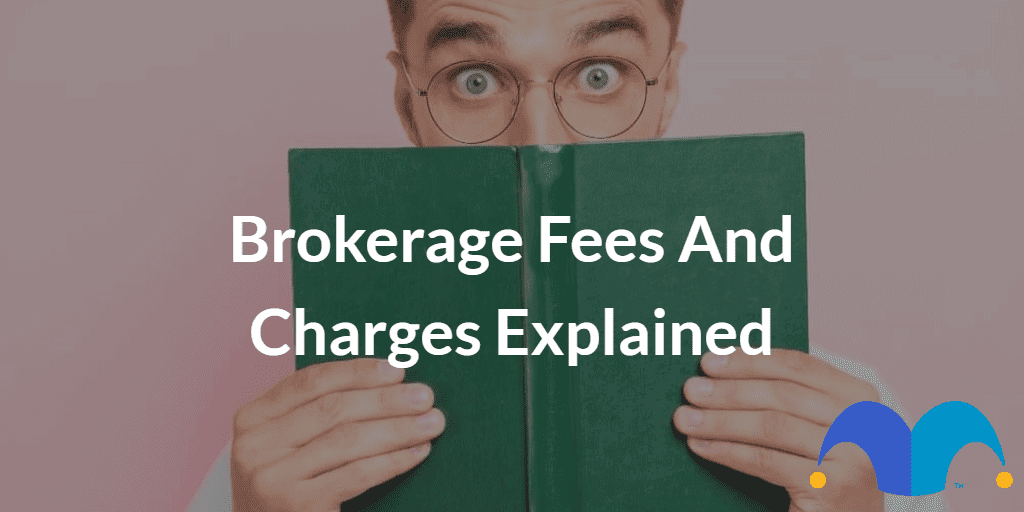Deciding to start investing is an exciting step. But there are a few things to consider first. One of those is brokerage fees. If you’re confused about these charges, don’t panic.
Read on to find out everything you need to know about brokerage fees and charges.
What are brokerage fees?
Simply put, brokerage fees are charged by a brokerage or platform for managing and holding any investments you have.
If you have a brokerage account, you will need to be aware of the potential fees or charges.
Without fees, brokerages and platforms would be unable to make any money. Therefore they’d be poor businesses and probably wouldn’t exist for you to use for your investments.
When do brokerage fees apply?
Fees can apply to both trading and non-trading related activities. When your brokerage fees apply depends on the brokerage you choose to use. Financial advisers, robo-advisors, self-directed investment platforms and funds all have different associated fees and charges.
Trading-related fees will generally apply when you open an account, when you make a trade or when you close your account.
Non-trading-related fees may occur on a more regular basis. Some platforms charge either an annual or monthly fee to manage your investments and to maintain the software you’re using.
Types of brokerage fees
There is a range of different types of brokerage fees.
Stock trading fee
Stock trading fees, also known as trading commissions, are charged whenever you buy or sell stocks.
You may also have to pay commissions or fees when you buy and sell other investments, like options or exchange-traded funds.
Trading fees can apply to a range of activities, including deposits and withdrawals, commissions and transactions, currency exchange and spread costs.
Management/advisory fee
You will normally pay a management or advisory fee to a financial adviser, either a person or a robo-platform. This fee is usually a percentage of the assets you have placed with the adviser.
Expense ratio
This is an annual fee charged on certain funds, like mutual funds, exchange-traded funds and index funds. Generally, you will be charged a percentage of the amount you have invested in the fund.
Mutual fund transaction fee
Mutual fund transaction fees are charged when you buy and/or sell some mutual funds. This does not apply to all funds, so check carefully when buying funds to see if this fee will apply.
Sales fee
Some brokers and/or salespeople charge a fee or commission on certain mutual funds they sell you.
Inactivity fee
Some brokerages will charge an inactivity fee if you haven’t made any trades or used your account for a certain period of time.
Research fee
Some platforms will charge a regular (often monthly) fee for access to ‘premium’ research that may help your investment strategy.
Exit fee
Some accounts will charge you a fee to close your account or move it to a different platform.
How do brokerage fees affect returns?
Brokerage fees, however small, will add up over time. This will impact the returns on your portfolio.
If, for example, your portfolio was up 5% in one year but you paid fees of 1.5%, then really your portfolio is only up 3.5%. This might not make a huge difference in one year, but it will start to really add up over a 10- or 15-year period.
Take the example of an investor who puts £300 a month into a brokerage account for 20 years. They achieve annual returns of 6%. During this time, they will have invested £72,000.
Here’s how different fees will affect their portfolio during the period:
| Total annual fees | Total account value after 20 years | Total sum lost to fees |
| 0.00% | £132,804 | £0.00 |
| 0.25% | £129,280 | £3,524 |
| 0.50% | £125,864 | £6,940 |
| 1.00% | £119,341 | £13,463 |
| 1.50% | £113,210 | £19,594 |
| 2.00% | £107,446 | £25,358 |
As you can see, over 20 years, you could end up losing out on a substantial sum of money due to fees, particularly if they are closer to 2%. Keeping your fees as low as possible can help you maximise your returns and get the most out of your investment.
How to avoid brokerage fees
It is possible to avoid brokerage fees, and you don’t have to pay through the roof to invest.
Some fees are very easy to avoid. For example, no one should pay an inactivity fee. Simply set a reminder to log into your brokerage account within the time limit to avoid having to pay. You may have to make a trade to fully avoid the fee.
You also don’t need to pay a research subscription. Many platforms offer this for free, and there is plenty of quality information available online too.
To reduce your costs, shop around and compare different share dealing platforms and their fees. Not all platforms will charge the same prices and some may be significantly cheaper than others for your requirements.
For instance, it is generally possible to find a brokerage that won’t charge you deposit and withdrawal fees. Many also don’t charge for commissions, currency conversion fees and account maintenance.
Make sure you are aware of all the costs that may apply before you settle on an account. You should be able to find details of all the charges on a company’s website. It may be hidden in the small print though, so look closely!
